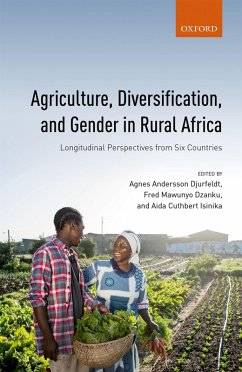This is an open access title available under the terms of a CC BY-NC-ND 4.0 International licence. It is free to read at Oxford Scholarship Online and offered as a free PDF download from OUP and selected open access locations. Agriculture, Diversification, and Gender in Rural Africa uses a longitudinal cross-country comparative approach to contribute to the understanding of smallholder agriculture in sub-Saharan Africa. Relying on unique household level data collected in six African countries since 2002, it addresses the dynamics of intensification and diversification within and outside agriculture in contexts where women have much poorer access to agrarian resources than men. Despite a growing interest in smallholder agriculture in Africa, this interest has not been matched by the research on the subject. While recent policies focus on reducing poverty through encouraging smallholder agriculture, there are few studies showing how livelihoods have changed since this time, and especially how such changes may have affected male and female headed households differently. Moreover, agriculture is often viewed in isolation from other types of income generating opportunities, like small scale trading. Agriculture, Diversification, and Gender in Rural Africa looks at how livelihoods have changed over time and how this has affected the relationship between agricultural and non-agricultural sources of livelihoods. In general, women have much poorer access to agricultural sources of income, and for this reason the interplay between farm and non-farm sources of income is especially important to analyse. Providing suggestions for more inclusive policies related to rural development, this edited volume outlines current weaknesses and illustrates potential opportunities for change. It offers a nuanced alternative to the current dominance of structural transformation narratives of agricultural change through adding insights from gender studies as well as village-level studies of agrarian development. It positions change in relation to broader livelihood dynamics outside the farm sector and contextualises them nationally and regionally to provide a necessary analytical adaption to the unfolding empirical realities of rural Africa.
Dieser Download kann aus rechtlichen Gründen nur mit Rechnungsadresse in A, B, BG, CY, CZ, D, DK, EW, E, FIN, F, GR, HR, H, IRL, I, LT, L, LR, M, NL, PL, P, R, S, SLO, SK ausgeliefert werden.

